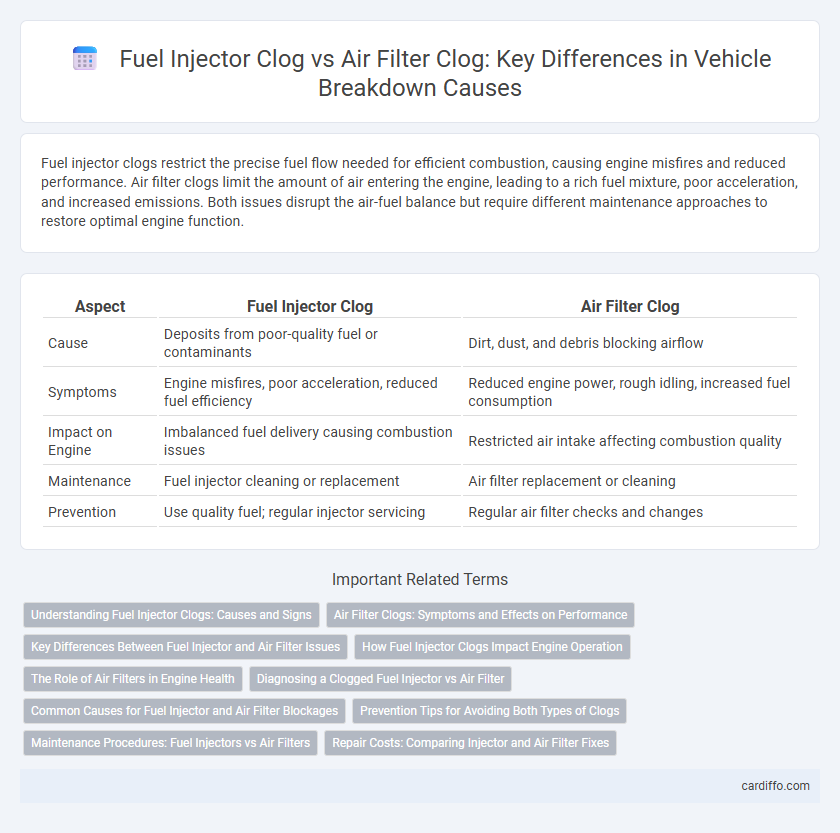Fuel injector clogs restrict the precise fuel flow needed for efficient combustion, causing engine misfires and reduced performance. Air filter clogs limit the amount of air entering the engine, leading to a rich fuel mixture, poor acceleration, and increased emissions. Both issues disrupt the air-fuel balance but require different maintenance approaches to restore optimal engine function.
Table of Comparison
| Aspect | Fuel Injector Clog | Air Filter Clog |
|---|---|---|
| Cause | Deposits from poor-quality fuel or contaminants | Dirt, dust, and debris blocking airflow |
| Symptoms | Engine misfires, poor acceleration, reduced fuel efficiency | Reduced engine power, rough idling, increased fuel consumption |
| Impact on Engine | Imbalanced fuel delivery causing combustion issues | Restricted air intake affecting combustion quality |
| Maintenance | Fuel injector cleaning or replacement | Air filter replacement or cleaning |
| Prevention | Use quality fuel; regular injector servicing | Regular air filter checks and changes |
Understanding Fuel Injector Clogs: Causes and Signs
Fuel injector clogs occur when dirt, debris, or carbon deposits accumulate inside the injector nozzle, disrupting the atomization of fuel and leading to inefficient combustion. Common causes include using low-quality fuel, infrequent maintenance, and contaminated fuel systems. Signs of a clogged fuel injector include rough idling, reduced engine power, increased fuel consumption, and engine misfires.
Air Filter Clogs: Symptoms and Effects on Performance
Air filter clogs restrict airflow to the engine, causing reduced acceleration, rough idling, and decreased fuel efficiency. Symptoms include increased engine temperature and black smoke from the exhaust due to incomplete combustion. Regular air filter maintenance prevents performance loss and potential engine damage caused by dirt and debris accumulation.
Key Differences Between Fuel Injector and Air Filter Issues
Fuel injector clogging primarily disrupts engine performance by causing misfires, reduced fuel efficiency, and increased emissions due to uneven fuel delivery, while air filter clogging restricts airflow, leading to poor acceleration, stalling, and lower engine power. Fuel injector issues often require chemical cleaning or replacement, whereas air filter problems usually involve straightforward filter replacement. Understanding these distinctions helps in accurate diagnosis and targeted maintenance to restore optimal engine function.
How Fuel Injector Clogs Impact Engine Operation
Fuel injector clogs restrict the precise fuel spray needed for optimal combustion, leading to engine misfires, reduced power, and decreased fuel efficiency. Unlike air filter clogs that primarily limit airflow, fuel injector blockages cause uneven fuel delivery and increased emissions. Consistent fuel injector maintenance prevents deposits buildup, ensuring smooth engine performance and avoiding costly repairs.
The Role of Air Filters in Engine Health
Air filters play a crucial role in maintaining engine health by preventing dirt, debris, and contaminants from entering the combustion chamber, which reduces the risk of damage and ensures efficient fuel combustion. A clogged air filter restricts airflow, leading to poor engine performance, increased fuel consumption, and potential engine misfires. Unlike fuel injector clogs that directly impact fuel delivery, air filter clogging primarily affects air intake, making regular air filter maintenance essential for optimal engine operation.
Diagnosing a Clogged Fuel Injector vs Air Filter
Diagnosing a clogged fuel injector involves checking for symptoms such as rough idling, poor acceleration, and increased fuel consumption, often verified through a fuel injector cleaning test or professional scan tool analysis. An air filter clog typically results in reduced engine power, black smoke from the exhaust, and decreased fuel efficiency, which can be identified by inspecting the filter element for dirt and debris buildup. Differentiating these issues requires a systematic approach including visual inspection, performance testing, and possibly fuel system diagnostics.
Common Causes for Fuel Injector and Air Filter Blockages
Fuel injector blockages commonly result from contaminated fuel containing dirt, debris, or additives that leave residue, causing poor fuel atomization and engine performance issues. Air filter clogs typically occur due to accumulated dust, pollen, and road grime, restricting airflow and reducing engine efficiency. Regular maintenance, including fuel system cleaning and air filter replacement, is essential to prevent these common blockages and ensure optimal engine operation.
Prevention Tips for Avoiding Both Types of Clogs
Regularly replacing fuel filters and using high-quality fuel can prevent fuel injector clogs by reducing contaminants that block fuel flow. Changing air filters every 12,000 to 15,000 miles ensures proper airflow and prevents dirt build-up that causes air filter clogs. Maintaining a clean fuel system and air intake, combined with routine engine inspections, maximizes performance and reduces the risk of breakdowns related to clogged components.
Maintenance Procedures: Fuel Injectors vs Air Filters
Fuel injector maintenance requires periodic cleaning with specialized solvents or ultrasonic cleaning to remove deposits and ensure optimal fuel atomization, while air filter maintenance involves regular replacement or cleaning of the filter element to prevent dust and debris from entering the engine. Fuel injectors benefit from professional diagnostic equipment to detect flow inconsistencies, whereas air filters can be inspected visually and replaced based on mileage or manufacturer recommendations. Proper adherence to these maintenance procedures enhances engine performance, reduces fuel consumption, and prevents breakdowns related to clogged components.
Repair Costs: Comparing Injector and Air Filter Fixes
Fuel injector repairs generally cost between $150 and $600 due to the complexity of cleaning or replacement, while air filter replacements are significantly cheaper, typically ranging from $20 to $50. Injector clog repairs may require specialized tools and professional service to restore optimal fuel flow and engine performance, adding to labor expenses. Air filter fixes are straightforward, often done as a routine maintenance task, which minimizes labor time and overall repair costs.
Fuel injector clog vs air filter clog Infographic

 cardiffo.com
cardiffo.com